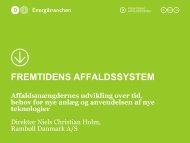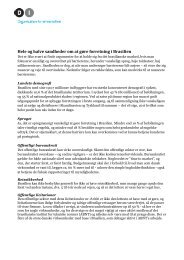Turning waste into climate-friendly energy
Turning waste into climate-friendly energy
Turning waste into climate-friendly energy
You also want an ePaper? Increase the reach of your titles
YUMPU automatically turns print PDFs into web optimized ePapers that Google loves.
KEEpING THE BIlls dOWN<br />
Calculations from Energinet.dk show<br />
that when heat pumps are deployed<br />
in the future, and petrol- and dieselengined<br />
vehicles have been replaced<br />
with EVs, electricity consumption by a<br />
typical family will treble, but the cost<br />
of it will not.<br />
”Although consumption will increase,<br />
the electricity bill will be 10-15<br />
percent lower because we will become<br />
more attentive to when it is cheapest<br />
to use electricity,” says Kim Behnke,<br />
THE DANISH ENERGY INDUSTRIES FEDERATION – SpEcIAl ADvERTISING SUpplEmENT<br />
head of research and environment at<br />
Energinet.dk.<br />
Old electricity meters have already<br />
been replaced with digital meters in<br />
half of all Danish households. Energinet.dk<br />
forecasts that the transition<br />
to tomorrow’s <strong>energy</strong> system, where<br />
a device will be coupled to the digital<br />
electricity meter to provide automated<br />
control of electrical equipment in the<br />
home, will gradually take place over<br />
the next three to five years. ·<br />
”It will be smart<br />
to let the large<br />
<strong>energy</strong> users,<br />
take the lead,<br />
They will realise<br />
significant economic<br />
benefits<br />
by saving on <strong>energy</strong><br />
at the right<br />
times,” says Kim<br />
Behnke.<br />
WAsTE-TO-<br />
ENERGY plANTs<br />
IN dENMARK:<br />
<strong>Turning</strong> <strong>waste</strong> <strong>into</strong><br />
<strong>climate</strong>-<strong>friendly</strong> <strong>energy</strong><br />
In Scandinavia, combustible<br />
household <strong>waste</strong> is fully used<br />
as a valuable and cost-effective<br />
resource for producing electricity<br />
and district heating.<br />
By Maren Urban Swart<br />
Denmark makes extensive use of the <strong>energy</strong><br />
contained in household <strong>waste</strong> by combusting<br />
it in combined heat and power stations,<br />
all of which are connected to the local<br />
district heating system.<br />
”Our use of <strong>energy</strong> from household<br />
<strong>waste</strong> is 100 percent, because the steam<br />
in the combustion flue gases is condensed<br />
and reused for heating. This has the effect<br />
of keeping our use of coal and gas to a<br />
minimum,” says director of technology and<br />
marketing Ole Madsen of Babcock & Wilcox<br />
Vølund, a leading international supplier<br />
of knowledge, equipment and technology<br />
for power plants which produce environmentally<br />
<strong>friendly</strong> <strong>energy</strong> from the combustion<br />
of household <strong>waste</strong> and biofuels.<br />
Denmark has cutting-edge knowledge<br />
and expertise in <strong>waste</strong>-to-<strong>energy</strong> technologies.<br />
The industry employs several thousand<br />
specialists engaged in optimising<br />
<strong>energy</strong> production in an environmentally-<br />
and <strong>climate</strong>- <strong>friendly</strong> way, and has great<br />
potential for creating exports and green<br />
growth.<br />
”Life Cycle Analysis shows that <strong>energy</strong><br />
production based on the combustion of<br />
<strong>waste</strong> is in most cases the most environmentally<br />
<strong>friendly</strong> and cost-effective way of<br />
using available technologies. This has been<br />
documented by researchers at the Technical<br />
University of Denmark in their assessment<br />
of a new state-of-the-art power station<br />
in Copenhagen,” says Madsen. ·





